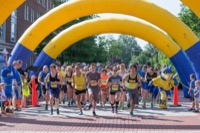
Feb. 9-24: 'Galileo: 400 Years'
Library exhibition case marks historic anniversary with 'Galileo: 400 Years'
3:37 p.m., Feb. 4, 2016--Feb. 26 marks the 400th anniversary of the Catholic Church’s judgment rejecting the idea that the sun is the center of the universe and that the Earth is a planet orbiting the sun. This pronouncement was decisive in the career of Italian mathematician and astronomer Galileo Galilei (b.1564 – d.1642), who was the most important living proponent of the rejected idea, also known as heliocentrism.
While versions of the heliocentric theory existed in ancient times, its modern version was put forth by Polish astronomer Copernicus (b.1473 – d.1543) in the early 16th century.
Events Stories
June 5: Blue Hen 5K
June 6-9: Food and culture series
To commemorate the events of February 1616, University of Delaware Library Special Collections will host a one-case exhibition titled “Galileo: 400 Years.” The exhibit will be located on the first floor of Morris Library, and will be on display from Feb. 9-24.
Before 1616, Galileo’s telescopic observations convinced him of the correctness of Copernicus’ theory, which contradicted the older “geocentric” cosmology. That idea dated back over one thousand years, and claimed that the sun and other celestial bodies circled the Earth, whose position was fixed. This was the view supported by the Catholic Church and enforced by means of the Inquisition, a body set up to suppress unapproved teachings by means of judicial procedures.
After the Inquisition rejected heliocentrism in 1616, Galileo was temporarily muzzled regarding his Copernican beliefs. Later, however, he published Dialogue Concerning Two Chief World Systems (1632).
The book displeased the Pope Urban VIII, on account of its implicit rejection of geocentrism. As a result, Galileo was found to be “suspect of heresy” and sentenced to house arrest for the remainder of his life. He was also required to renounce heliocentrism publicly, which he did. As is now known, the heliocentric view later prevailed.
The exhibition will feature a 1710 edition of Galileo’s Dialogues, printed in Florence, and a 1916 English translation of the same work, from the library of playwright Barrie Stavis. Stavis’ 1947 play Lamp at Midnight is based on the life of Galileo.
Stavis’ copy of the play will also be on display in the exhibit. University of Delaware Library Special Collections houses the papers of Barrie Stavis.
The exhibition will be curated by Curtis Small, assistant librarian, Special Collections Department. An online version will also be available at this site.








